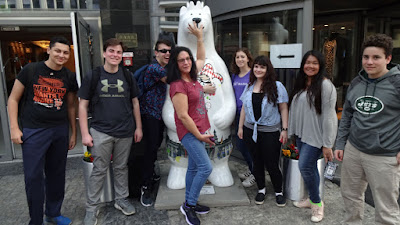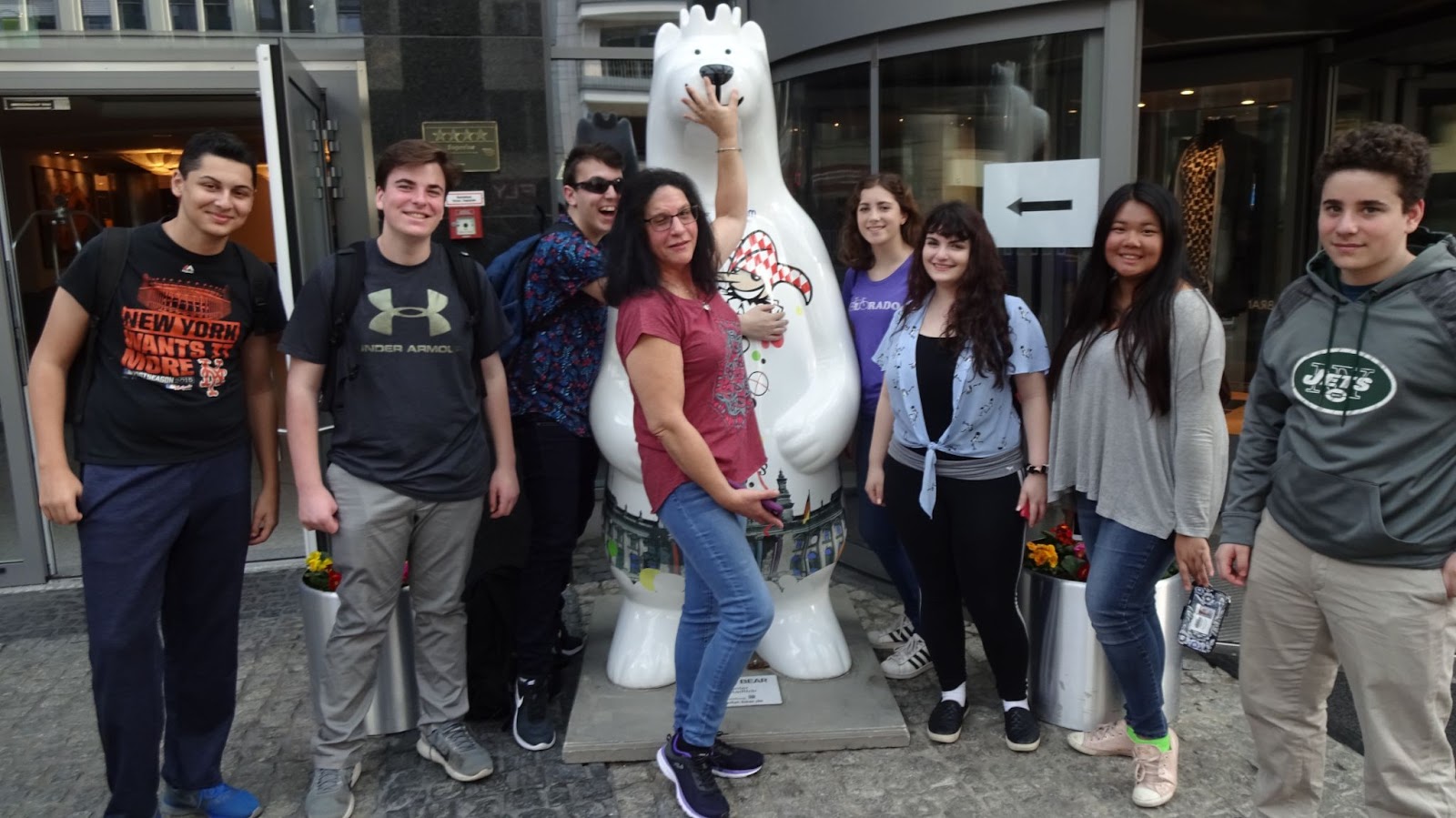How wonderful to find a heroic woman! Her worth is much higher than pearls.* -Proverbs 31:10
I am not the biggest fan of the section of Proverbs known as Eishet Chayil - A Woman of Valor. The qualities which are lifted up are sexist**, contradictory, and frankly unlikely, but at this moment, when contemplating what our Temple Administrator, Barbara Cooke has been to our community, her value to our Temple community is obviously more than pearls.
The protagonist of the Biblical text is utterly selfless in her dedication to her spouse, her family, and her community. Even before the recent pandemic, Barbara was not only in the office many more than her assigned hours, but also answered e-mail and phone calls (on her personal cell phone!) at all hours. As much as we tried to tell her that she deserved her rest, and could at least take off Shabbat, she often checked in to make sure that everything was set up, or even to see how a service had gone. Once the Temple office was closed, Barbara went from just about full time to on all the time. I think she felt guilty that she wasn’t able to be physically present in our building and wanted to make sure that we were there for everyone, especially in such a difficult time.
One of Barbara’s greatest gifts to our congregation has always been her presence. No matter what urgent task she was in the middle of, when the phone rang, Barbara picked up the line and was fully focussed with whomever she was speaking, for however long they needed - that ranged from sharing important information about the Temple, registering RSVP’s, taking tributes, to helping people with their computers and e-mail. Barbara was often not only the first contact for congregants reaching out, but for prospective members and members of the outside community as well.
It is a great joy to know that Barbara is not leaving our Temple family. When she first started as secretary, Barbara felt it was important to also be a member of the community that she was serving. As soon as her youngest child celebrated his Bar Mitzvah, they joined us formally. Jordan was confirmed at Temple Sholom, Lou has been an active member of our Men’s Club, Religious Practices, and Re-Opening Task Force. We’ve even seen Chelsea occasionally. Barbara is a part of our Temple family, because her family is ours as well.
Barbara has not only served on several committees (membership, fundraising, 100th anniversary - to name just a few), but also has been the one to step up and do the work that needed to be done, when volunteers were unable or unavailable. So many things at Temple Sholom happened - to all outside appearances, smoothly - because Barbara was always on top of everything. Just one small illustration - Barbara was sad last Friday that she was plating her last batch of oneg cookies for the congregation - something which she took care to do to make sure that our post-service Shabbat gathering was that much more special.
Barbara has been an invaluable support to me, as your Rabbi, and as a fellow member of the Temple Sholom community; always trying to make what I was doing easier, and flowing more easily; always sharing reminders and gentle hints about with whom I should be checking in. We are all human beings with human faults - everyone should have a Barbara to help minimize them.
I also had a chance to see a bit of a different side of Barbara when she served as chaperone on our Confirmation trip in 2018. She was not only an excellent chaperone - providing just the right amount of organization with the ability to be a role model to the students. It was a joy to watch her enjoy what she had often worked so hard to make sure was a great experience - both for her son and for so many of our congregants.
 Barbara, we are incredibly grateful for what you have shared with us, so overjoyed that you and your family are not going anywhere, and wish you luck in your new position. You are truly our hero. Thank you, from the bottom of our hearts.
Barbara, we are incredibly grateful for what you have shared with us, so overjoyed that you and your family are not going anywhere, and wish you luck in your new position. You are truly our hero. Thank you, from the bottom of our hearts.
Rabbi’s Column - Summer 2021
How wonderful to find a heroic woman! Her worth is much higher than pearls.* -Proverbs 31:10
I am not the biggest fan of the section of Proverbs known as Eishet Chayil - A Woman of Valor. The qualities which are lifted up are sexist**, contradictory, and frankly unlikely, but at this moment, when contemplating what our Temple Administrator, Barbara Cooke has been to our community, her value to our Temple community is obviously more than pearls.
The protagonist of the Biblical text is utterly selfless in her dedication to her spouse, her family, and her community. Even before the recent pandemic, Barbara was not only in the office many more than her assigned hours, but also answered e-mail and phone calls (on her personal cell phone!) at all hours. As much as we tried to tell her that she deserved her rest, and could at least take off Shabbat, she often checked in to make sure that everything was set up, or even to see how a service had gone. Once the Temple office was closed, Barbara went from just about full time to on all the time. I think she felt guilty that she wasn’t able to be physically present in our building and wanted to make sure that we were there for everyone, especially in such a difficult time.
One of Barbara’s greatest gifts to our congregation has always been her presence. No matter what urgent task she was in the middle of, when the phone rang, Barbara picked up the line and was fully focussed with whomever she was speaking, for however long they needed - that ranged from sharing important information about the Temple, registering RSVP’s, taking tributes, to helping people with their computers and e-mail. Barbara was often not only the first contact for congregants reaching out, but for prospective members and members of the outside community as well.
It is a great joy to know that Barbara is not leaving our Temple family. When she first started as secretary, Barbara felt it was important to also be a member of the community that she was serving. As soon as her youngest child celebrated his Bar Mitzvah, they joined us formally. Jordan was confirmed at Temple Sholom, Lou has been an active member of our Men’s Club, Religious Practices, and Re-Opening Task Force. We’ve even seen Chelsea occasionally. Barbara is a part of our Temple family, because her family is ours as well.
Barbara has not only served on several committees (membership, fundraising, 100th anniversary - to name just a few), but also has been the one to step up and do the work that needed to be done, when volunteers were unable or unavailable. So many things at Temple Sholom happened - to all outside appearances, smoothly - because Barbara was always on top of everything. Just one small illustration - Barbara was sad last Friday that she was plating her last batch of oneg cookies for the congregation - something which she took care to do to make sure that our post-service Shabbat gathering was that much more special.
Barbara has been an invaluable support to me, as your Rabbi, and as a fellow member of the Temple Sholom community; always trying to make what I was doing easier, and flowing more easily; always sharing reminders and gentle hints about with whom I should be checking in. We are all human beings with human faults - everyone should have a Barbara to help minimize them.
I also had a chance to see a bit of a different side of Barbara when she served as chaperone on our Confirmation trip in 2018. She was not only an excellent chaperone - providing just the right amount of organization with the ability to be a role model to the students. It was a joy to watch her enjoy what she had often worked so hard to make sure was a great experience - both for her son and for so many of our congregants.

Barbara, we are incredibly grateful for what you have shared with us, so overjoyed that you and your family are not going anywhere, and wish you luck in your new position. You are truly our hero. Thank you, from the bottom of our hearts.
Rabbi Joel N. Abraham*translation mine. “Heroic for chayil can be found here - https://jewishstudies.washington.edu/hebrew-humanities/woman-valor-speak-hebrew-wonder-woman-superpower/
** Some feminist translations/interpretations of this text can be found here - https://jwa.org/node/23715
Rabbi Joel N. Abraham
*translation mine. “Heroic for chayil can be found here - https://jewishstudies.washington.edu/hebrew-humanities/woman-valor-speak-hebrew-wonder-woman-superpower/
** Some feminist translations/interpretations of this text can be found here - https://jwa.org/node/23715